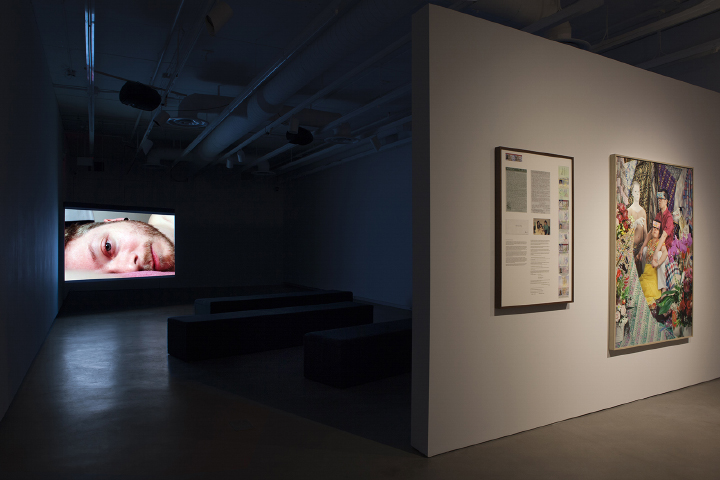False Idol x North Kin Exhibition Essay
A Family Affair
“FAMILIES DO NOT HAVE BORDERS” a bright orange ribbon announces in red serif letters, alongside a Kelly green one that reads “WOMEN DON’T OWE YOU SHIT.” The ribbons belong to Andrea Bowers’s work Political Ribbons (2016) and used to hang from my old bed frame. I think about these ribbons often, their statements which possess the resolute spirit of a Jenny Holzer Truisms and which require no further clarification. Broadly defined, “family” is a social or cultural group that stems from an ancestral line, though it need not be biological. Synonymous to “kin,” the meanings of both words have been tossed back and forth in contemporary usage, but in recent years, kinship has regained currency as an open and expanded idea of interconnectedness and relations beyond blood or the boundaries of species.
Leonard Suryajaya’s exhibition False Idol x North Kin considers the overlapping of family with kinship, and the knotty relationship between home and diaspora spanning from Indonesia and United States to the land now called Canada. His baroque, tableau vivant-style individual and group portraits are works of love, if humorous takes on relations and their thorny proclivities. They record the social aspect of posing for the camera and gathering to commemorate an occasion, a communal moment in time. And as Suryajaya’s large format photographs suggest, they also show just how far the collective will go to support a loved one; the answer is very far if the works Kinfolk Lipsync (2017) and the hilarity of Dad Duck (2020) are any examples. In the former, the artist stuffed his family’s mouths with rose apples, the fruits’ bottoms facing outwards in a sly and subversive image. Whether they knew it or not, the family members were made to acknowledge Suryajaya’s queerness, which was a secret to some at the time. The latter photograph captures an irreverent portrait of the artist’s father dressed in a sarong, beaded necklaces and robe open down the front. Sporting colourful periwinkle and aqua makeup that echoes the fervent backdrop, he grasps a Peking duck by its neck, sprigs of parsley obscuring its sex, while his daughter Novi (Suryajaya’s younger sister) holds two glass cupping devices atop his head like horns.
Suryajaya’s works play not only with his family’s image, but also their language. The photograph Letter from Daddy (2017) composes reproductions of letters from his father with a family snapshot and running margin of scanned passport pages and immigration documents. A meditation on cultural and textual translation, the work records the grey zone of understanding generated between the elder Suryajaya—as an Indonesian person of Chinese descent—in handwritten letters to his then eighteen-year-old son, and the words’ subsequent slippage from broken Indonesian to translation into English. Despite grammatical gaps, there’s no mistaking the message; all sentiment, instructions and parental guidance remain clear as ever. In parallel, while the modern nation state of Indonesia aimed to crush perceived pro-Communist sympathies in the late 1960s by eradicating Chinese culture—Chinese Indonesians did not receive status until 2000 after social policy reforms—they could not extinguish the flame of Chineseness forever.
Undoing intergenerational trauma is already a feat, never mind when it’s something undone from afar. But maybe it’s just that. We see ourselves more clearly when we’re not in our homeland, surrounded by loved ones who attempt—maybe unintentionally, maybe forcefully—to smooth over our bumpy edges and glitchy selves. But a homeland is neither necessarily community nor citizenship in a broader sense; it represents only unchanging truths about where we are born or where our ancestors originate, that’s if the latter can even be traced. In this way, the understanding of “homeland” as physically fixed or politically oriented within geographical borders may not always jive with an interior feeling of belonging in flux. With Chinese diaspora sprinkled throughout the world, home becomes a difficult thing to pin down. Beyond a simple notion of hybridity, culture, race, faith and citizenship endlessly entangle in a web of relations, such that we can simultaneously be of many places, or none at all. At times, home seems impossible or unreachable, an ever-floating point on the geopolitical map. And yet, we somehow find comfort and understanding in the in-between, flitting between places that satiate the mind or body, if only for a moment.
Must our diasporic bodies ping pong back and forth in a constant mode of displacement, always rootless? How might we instead construct a home for our hearts? In her book All About Love (2001) bell hooks speaks of healing family trauma as a pathway to love and liberation:
Whenever we heal family wounds, we strengthen community. Doing this, we engage in loving practice. That love lays the foundation for the constructive building of community with strangers. The love we make in community stays with us wherever we go. With this knowledge as our guide, we make any place we go a place where we return to love. (p. 144).
Kin are our immaterial home; be they family, friends or lovers, we are “at home” in our psyche, comfy and still. Let our communities rise up around us to share and support our versions of home, however many there may be, wherever they are.
– Charlene K. Lau



